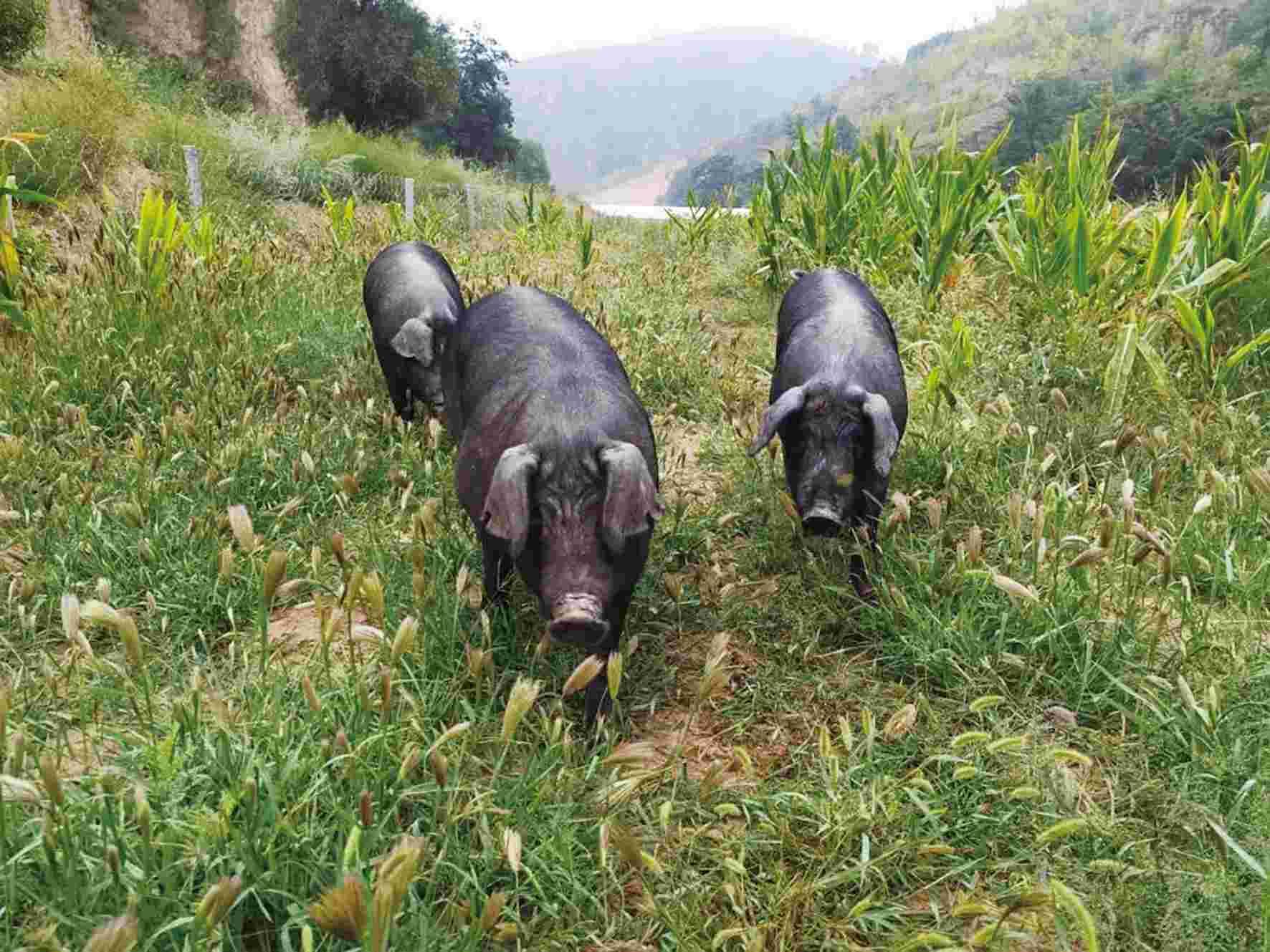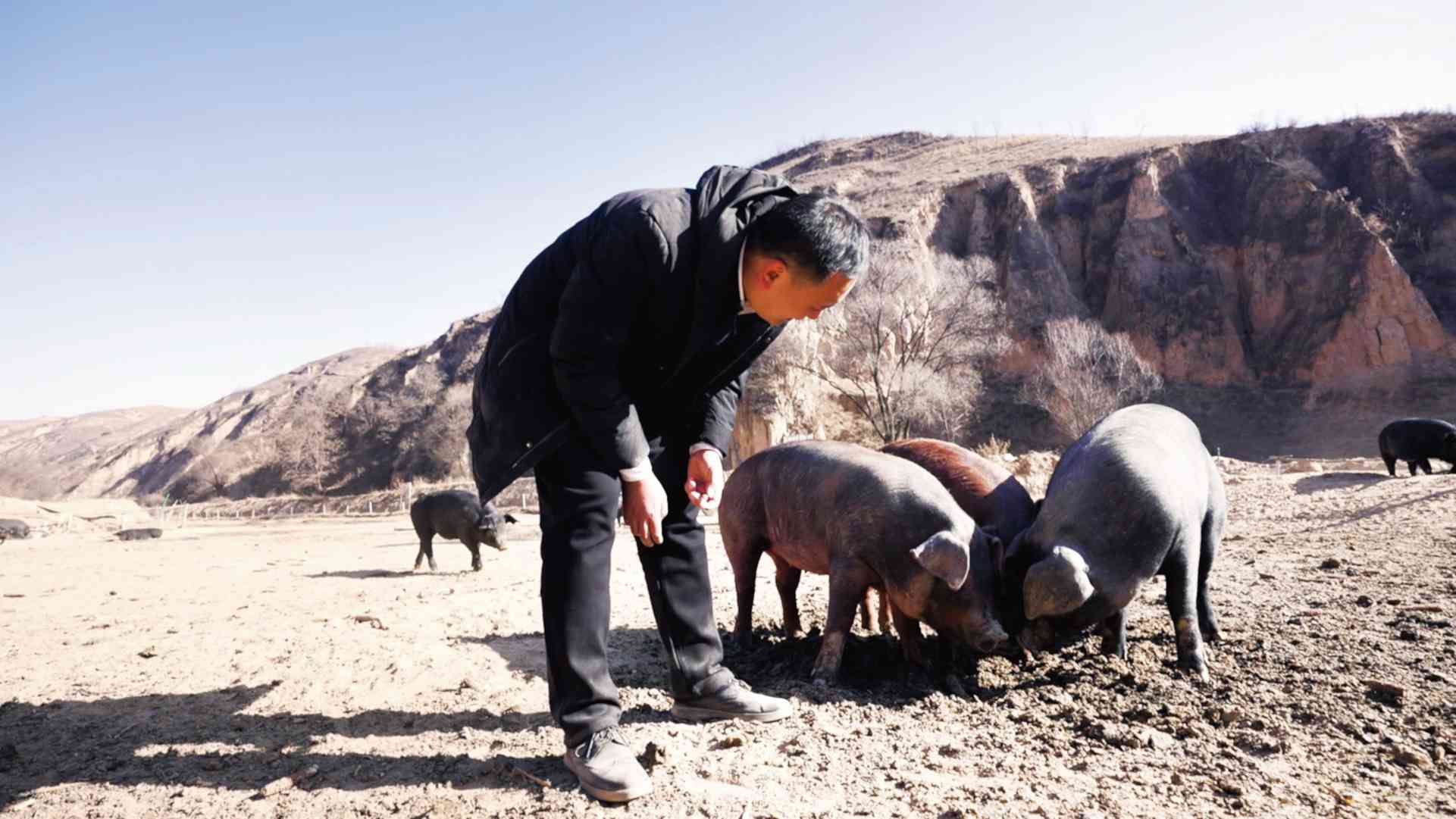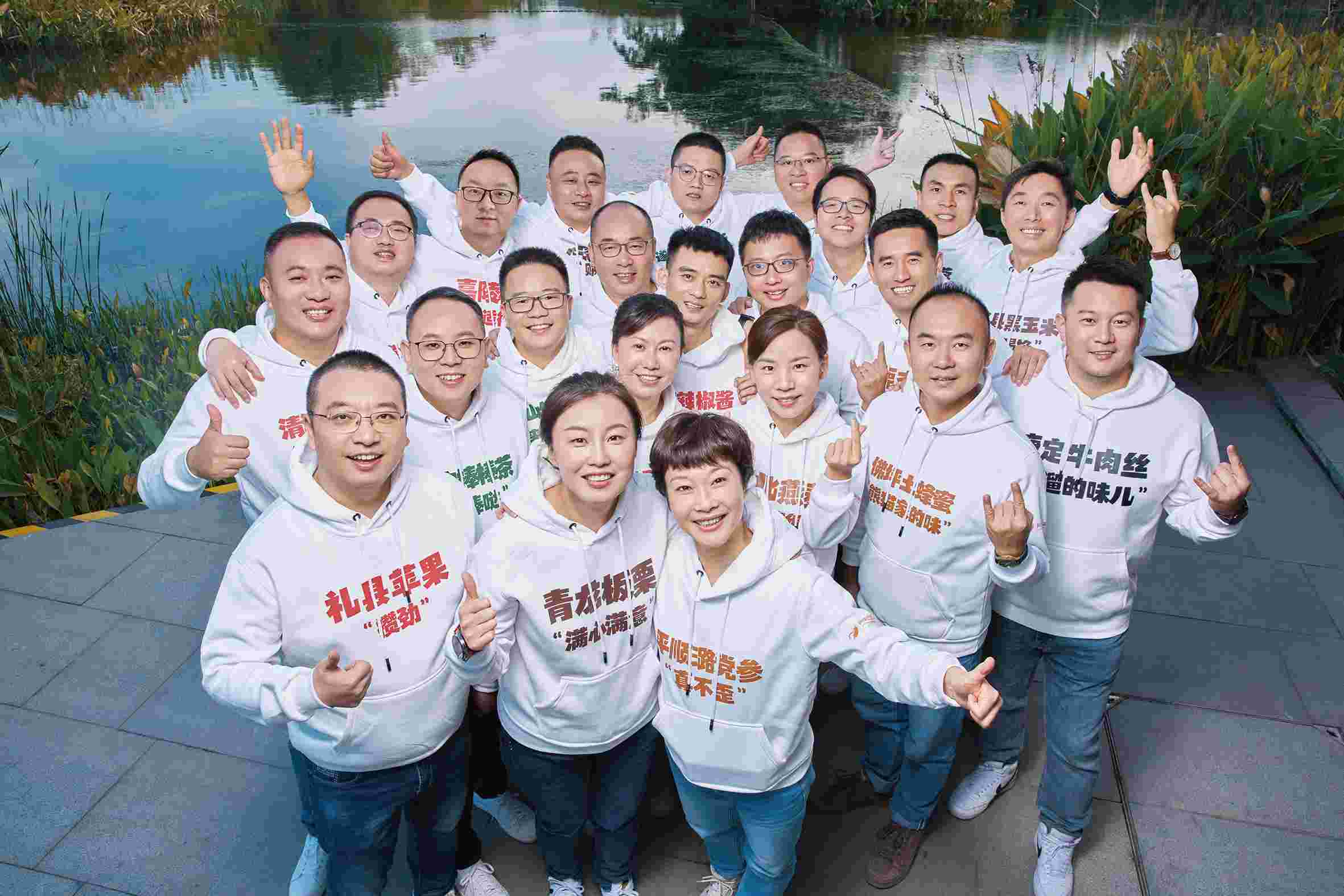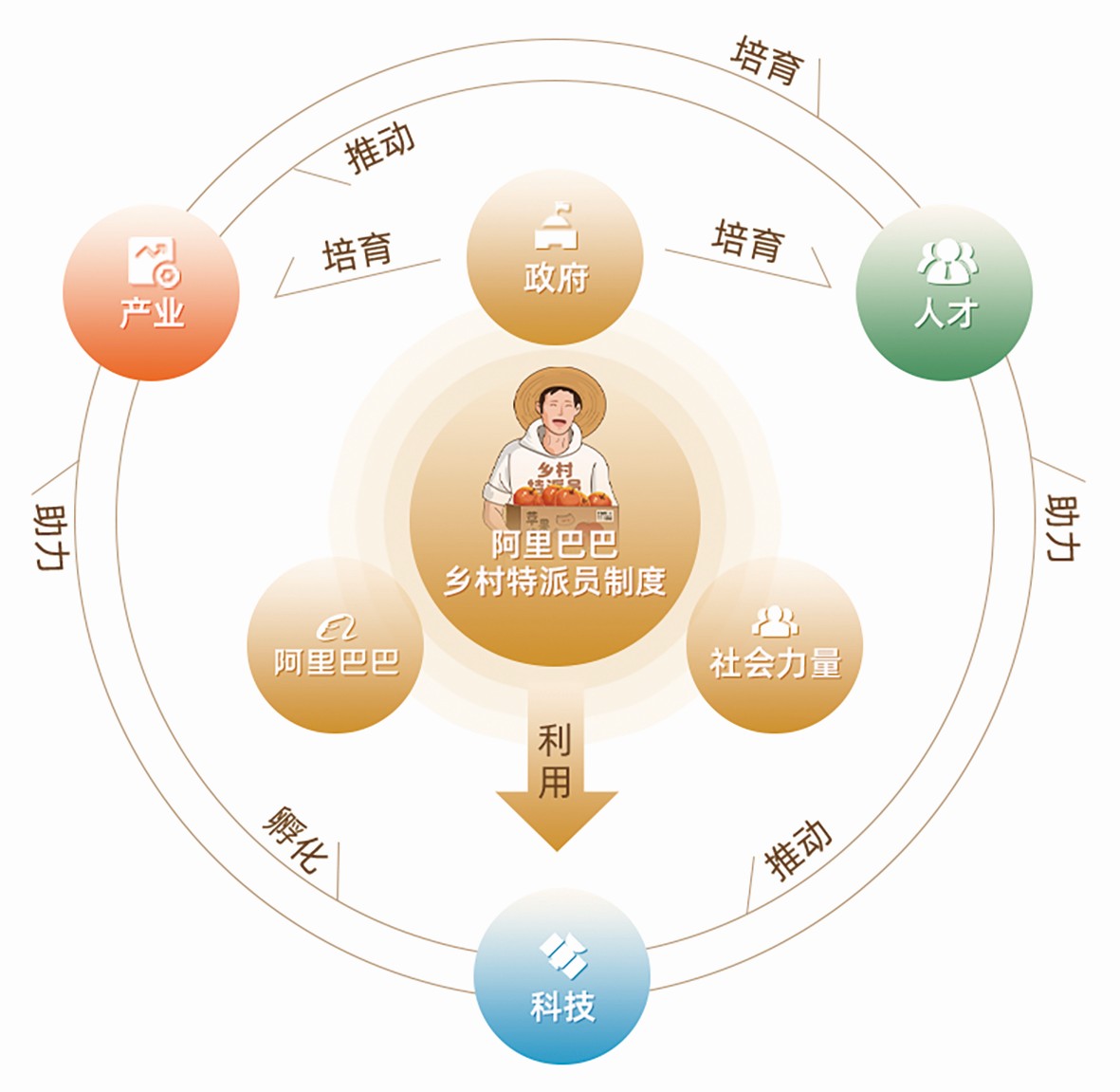Driven by passion and equipped with advanced digital tools, these “commissioners
consistently relay inspiring success stories of transformation from the countryside.
An Alibaba senior employee, now donning the role of a “Rural Revitalization Commissioner,” journeyed to isolated mountain villages. Armed with digital technology and internet-driven insights, he aimed to uplift struggling industries by directly connecting rural farm fields with urban dining tables. The story of the “running pig” is just one of many successes achieved by the 27 rural revitalization commissioners.

Liang Yu, a veteran employee of Alibaba, found himself amidst the picturesque countryside, guiding a spirited group of indigenous black-haired pigs as they energetically trotted around. Having worked with Alibaba’s operations for over a decade in bustling Shanghai,Liang’s shift to rural pig farming was a startling surprise for many. Friends and colleagues often jestingly remarked how Liang, a white-collar, had only ever savored pork on his plate yet never witnessed the lively prance of pigs firsthand. Even Liang himself hadn’t envisioned this pastoral chapter in his life. His inspiration stemmed from the heartwarming tales of Alibaba’s rural revitalization commissioners. A deep-seated desire grew within him to make a tangible difference in the countryside.
The seeds of this transformation were sown by a public welfare initiative Alibaba launched four years ago.
From the office to the field
Under the guidance of a package of policies “charting the roadmap for rural revitalization” released by the CPC Central Committee and the State Council in 2018, Alibaba quickly responded by launching the Rural Revitalization Commissioners Program in 2019. In this program, experienced Alibaba employees are chosen to be deployed to less developed counties, utilizing Alibaba’s resources to aid in local development tailored to the specific needs of each area. The heart of this endeavor was to invigorate industries in economically disadvantaged regions, rejuvenating the countryside.
As more rural revitalization commissioners were deployed and the program advanced, Liang Yu came across inspiring stories of Alibaba’s commissioners making a positive impact in local communities. A spark was kindled. In May 2021, when Alibaba unveiled the “Hot Land”Program - a holistic initiative focusing on technology, industry, and talent to further amplify rural revitalization - Liang was quick to throw his hat in the ring. Battling through rigorous assessments, he stood out among thousands, eventually assuming the role of a rural revitalization commissioner. His assignment took him to Qingjian County, Yulin City, Shaanxi Province, where he dedicated himself full-time to local rural revitalization efforts.

Qingjian was recognized as a national-level poverty-stricken county in 1994 and a contiguous poor area in Luliang Mountain in 2014. With the backing of targeted poverty alleviation policies and widespread societal support, Qingjian County successfully eradicated poverty on February 27, 2020. However, while the per capita annual income in the region has surpassed the poverty threshold of RMB 4,000, the overall income levels remain relatively low, and households that have been lifted out of poverty still face the risk of slipping back into it.
After winning the battle against poverty, China established a 5-year transition period to consolidate and expand the achievements in poverty alleviation and to promote the revitalization of rural areas. It has been proposed that by 2025, the economic vitality and development potential of previously impoverished areas will be significantly enhanced, and the quality, efficiency, and competitiveness of rural industries will further improve.
The revitalization of rural industries is at the core of rural revitalization and requires a systematic transformation of industrial development methods, structures, and dynamics. Although Qingjian County had successfully eradicated poverty, the local industrial development still encountered bottlenecks. This was the very challenge that Alibaba expected Liang Yu to address.
Smart pig farming? Villagers did not buy it
To foster rural industries, it is essential to adapt them to the local environment and emphasize the promotion of “specialty products.” In May 2021, shortly after his arrival in Qingjian County, Liang Yu conducted an extensive investigation into the local specialty industries. He discovered that the area’s natural conditions made it highly suitable for agricultural and livestock development. Local red dates and black-haired pigs had carved out their market niches. The latter, particularly, were a market darling, fetching premium prices due to their tender meat, rich flavor, and nutritional value. Their prices were considerably higher than those of regular white pigs, making black pig farming a highly promising industry. In 2019, the number of black pigs raised in Qingjian County reached a total of 100,000. However, due to their high raising costs and the lengthy ROI cycle, local breeders were frequently affected when pork prices declined. At times, black pig meat was even sold at prices equivalent to regular pork. The recent price fluctuations in the pork market have also significantly impacted local pig farmers. If they were unwilling to sell their black pigs at low prices, they could only bear losses themselves. One breeder, having raised black pigs for nearly four decades, remarked ruefully, “No more black pigs for me in the future.”


Liang Yu spotlighted the tribulations of black pig breeders. His mind raced, pondering how to harness Alibaba’s resources to support the local black pig farming industry.
Rural industries exhibit a relatively higher reliance on resources and the environment. Research by scholars has revealed that in regions with well-developed rural industries, there is typically a stronger alignment between industry structure and resource distribution. This alignment fosters a positive cycle, facilitating the conversion of resource advantages into industrial strengths. However, in some rural areas, abundant resources lie dormant. Local industries are just mimicking successes, scaling rapidly, and bulking up. This approach would inevitably birth a glaring uniformity across rural industrial projects.
Liang Yu recognized that the “pig cycle” resulted not only from supply and demand contradictions but also from the significant product homogeneity in the market. To him, the path was clear:elevate the black pig meat’s quality, enrich its value, craft a distinct brand aura, and carve out varied, stable sales avenues. All aimed at nurturing the black pig sector and padding the breeders’ wallets.
With the flourishing development of smart agriculture in rural China, Liang Yu contemplated harnessing Alibaba’s digital technology to establish an “intelligent pig farm” where the growth of black-haired native pigs could be delicately controlled. This would allow for the quantification and traceability of pork quality, and consequently enhance the product’s added value. Such an approach would provide greater security for the pricing and market of black pig meat. Excitedly, he shared his vision with the villagers, but to his astonishment, the local residents met him with skeptical glances. Despite his fervent pitches, no one believed that his “intelligent pig farm” would genuinely generate profits. The disheartened breeders were unwilling to invest their hard-earned money to collaborate with im.
Ultimately, he enlisted the support of Han Yongwen, a graduate of Northwestern Poly technical University who had returned to his hometown to pursue entrepreneurship after leaving a high-paying urban job. Han Yongwen resonated with Liang Yu’s idea and agreed to pilot it at his own breeding facility. With success, they planned to scale it up county-wide.
Upgrading pig farming with digital technology
In Qingjian County, black-haired native pigs are typically housed in pens for the initial four months before being granted the freedom to roam. Liang Yu found that these black pigs, once released from their pens, were actually quite active. They were not just wanderers; they were sprinters, reaching speeds of 40 miles per hour for a duration of half an hour, and displaying an agility of leaping up to 2 meters on hilly terrains. Humans, even the most sprightly, would find it a challenge to keep up. To cultivate high-quality black-haired native pigs with measurable quality, Liang Yu enlisted the assistance of colleagues from Alibaba’s technology department. Together, they developed a specialized “pedometer” designed for pigs, tracking their every sprint, trot, and stroll by attaching these devices to their ears.
To enhance the quality of the pork, giving it a marbling texture akin to premium beef, Liang Yu took additional measures. He not only granted the pigs the freedom to wander in the mountains, soak in the sun, play, and graze on wild grasses for improved nutrient absorption but also implemented two daily exercise sessions. Under the watchful eye of the “digital overseer,” the pigs at the breeding facility were mandated to complete a minimum of 20,000 steps every day.
At times, Liang Yu took a hands-on approach in guiding the black pigs, encouraging them to frolic and run freely. Over time, he developed a keen understanding of their individual temperaments, identifying the timid ones, those with more spirited personalities, and those that readily follow his lead. Liang Yu, serving as a rural revitalization commissioner, earned the nickname “the Black Pig Webmaster” among the local villagers. In this role, he not only meticulously oversaw the exercise regimens of the pigs and regularly monitors their growth, but also transformed this group of spirited black-haired native pigs into “athletic champions.”Moreover, he delved deeply into pig farming techniques, and elevated the traditional pig farming methods in Qingjian County to sophisticated practices. The pigs were housed in cave dwellings and provided with red dates, mountain spring water, and alfalfa. Liang Yu even used loudspeakers on the farm to play “Daoqing,” a local intangible cultural heritage opera, crafting an artistic and tranquil ambience for the pigs. The objective was to convert the rural assets in terms of resources, ecology, and culture into industrial advantages, and ultimately enhancing the quality, efficiency, and competitiveness of the pig breeding industry.

Yet, high-quality black pigs needed more than local accolades; they needed customer recognition and market endorsement. To achieve this, Liang Yu utilized Alibaba’s digital technology to assign unique IDs to each pig, detailing their breed, age, weight, eating habits, and even exercise frequency. Thanks to digitalized breeding and management, it is now possible to trace the physical condition and health information of every black-haired native pig entering the market, ensuring the preservation of the coveted “marbling” texture in their meat. Over the entire breeding cycle of these black pigs, each one must amass a total of 5 million steps before being market-ready. In light of this, Liang Yu proposed the catch “5 Million Step-Running Pigs” branding, which soon became a market favorite.
With the success of the black pig breeding base, the digitized and branded breeding approach began to be promoted throughout the entire county. Han Yongwen has initiated collaborations with local independent swine producers, entering into agreements to purchase their four-month-old penned black pigs at a guaranteed price. These acquired black pigs are then collectively raised to establish a large-scale breeding operation that secures market supply. This strategy mitigates the risks of market price fluctuations for individual breeders, thereby safeguarding their interests and encouraging more farmers to engage in black pig farming. Moreover, it ensures both the stable quality and consistent market supply of black pig meat, laying the groundwork for serving a broader consumer market.
Expanding sales across the country
Following the assurance of both black pig quality and supply, the subsequent challenge lies in market expansion. Liang Yu bridged local operations with Alibaba Group’s “new retail platform, Hema Xiansheng (hereinafter referred to as Hema). Hema is a chain of supermarkets with a presence of 300 stores across China’s first and second-tier cities. In 2022, it boasted a remarkable sales revenue of RMB 61 billion, with individual outlets averaging over RMB 200 million.

Selling black-haired native pig products on Hema’s shelves entails adhering to more stringent breeding and quality standards, down to specific details such as “ensuring that the fat thickness between the pig’s sixth and seventh rib does not exceed 3 centimeters. Black-haired native pigs raised to meet these elevated standards naturally command premium prices at Hema. In standard markets, the price hovers around RMB 30 per kilogram, choice cuts like the hind leg and tenderloin can command between RMB 35 to 40 per kilogram. However, at Hema, these prices soar even higher, often touching or surpassing RMB 50 per kilogram.


On May 31, 2022, the People’s Government of Qingjian County signed a framework agreement with Hema to create “Hema County” in Shaanxi. More than ten specialties from Qingjian, such as black-haired native pigs, red date juice, and greenhouse vegetables, have been gradually introduced to Hema’s sales platforms, being accessible to more urban consumers.In July 2022, Qingjian’s black pig meat made its official debut at Hema and quickly garnered substantial consumer acclaim. This milestone not only signaled the establishment of the black-haired native pig brand but, more significantly, instilled hope in breeders who had once considered forsaking their trade due to plummeting pork prices. In 2022 alone, Qingjian County sold 3,850 black-haired native pigs through Hema, achieving sales revenue of RMB 10.6 million and boosting the income of eight breeding farms by RMB 1.95 million. Qingjian’s black pigs have garnered popularity nationwide.
In addition to fostering the growth of the black pig breeding industry, Liang Yu also discovered a product made from local red dates known as “Zi Jing Zao” (Purple Crystal Dates). He collaborated with local villagers to leverage the internet to enhance the product’s flavor profile, packaging, and marketing approach. At a Baba Farm event in 2022, Qingjian red dates were swiftly sold out, achieving monthly sales exceeding 200,000 orders and completely exhausting the inventory.
As experts have pointed out, closed industrial systems grapple with sustainability, while modern industrial systems lean towards openness and collaboration. The more deeply the rural industrial system integrates into the urban-rural economic cycle, the more dynamic and adaptable it becomes in response to market demands.
“If you’re on the right path, distance is no concern.” Liang Yu said.
Since assuming the position of rural revitalization commissioner in Qingjian County, Liang Yu has fostered the growth of vegetable and fruit cultivation, livestock farming, slaughtering,and deep processing, all of which have firmly established roots in Qingjian. He has spearheaded the digital transformation, extending it from urban to rural areas, and effectively connecting rural “lands” to urban “dining tables.” These endeavors have not only drawn many back to their rural roots but has also sown seeds of prosperity for the villagers.
Sustained dedication to rural development
In July 2022, Alibaba launched the “Hot Land Program 2022”, reaffirming its dedication to stationing seasoned employees as rural revitalization commissioners. By providing support in industry, human resources, and technology, Alibaba aims to play a significant role in rural revitalization. Today, the “Rural Revitalization Commissioners” program has become the core and an esteemed component of Alibaba’s rural revitalization efforts. As of March 31, 2023, a total of 27 rural revitalization commissioners, similar to Liang Yu, have been appointed.
For instance, tasked with popularizing mountainous chestnuts from Qinglong County, Hebei Province, Liu Lin, a rural revitalization commissioner stationed in the county, collaborated with local university student Han Wenliang to lead villagers in live streaming on social platforms. Even a 58-year-old local resident named Li Cuifen has accumulated more than 2,000 fans in her live stream. Today, Qinglong boasts an e-commerce village with over a hundred Taobao shops, and has incubated a total of 339 e-commerce professionals, with sales exceeding RMB 5 million.

Then there is Li Heping, a rural revitalization commissioner based in Leishan, Guizhou. He collaborated with the county government to organize a rural poetry competition for local children. In Foping, Shaanxi, rural revitalization commissioner Gao Quan, in partnership with Alibaba’s charitable design officers, crafted a distinctive brand for honeysuckle water. During a live streaming session, the brand’s products received an astonishing 3,000 orders in just 3 minutes. Amid the pandemic, Liu Han, stationed in Yongshun, Hunan, personally traversed the Xiangxi mountains, delivering supplies directly to local residents’ homes.And the list of such inspiring tales goes on.
These 27 Alibaba rural revitalization commissioners have embarked on missions to 25 counties throughout China, embracing remote mountainsides and fields as their unconventional “work-spaces.” Leveraging e-commerce and technology, their endeavors have not only made high-quality mountain village products accessible to urban consumers but have also integrated Alibaba’s cutting-edge digital technology into these charming rural locales. Their tireless efforts have not only advanced industrial development at the county level but have also fostered local talent while contributing to the elevation of digitalization and public service standards in these counties. Over the past few years, these Alibaba employees have journeyed through local villages and embraced life alongside the villagers.They have extended the reach of the internet into the heart of the mountains, introduced digital technology to local farmers, and turned elderly farmers, once toiling with hoes, into “digital farmers” and “live-streaming experts” capable of connecting with urban consumers at any given moment. Furthermore, they have played a pivotal role in establishing local smart logistics centers that have facilitated the efficient and cost-effective transport of high-quality agricultural products from the mountains to the wider world.
Acting as a vital nexus between Alibaba and the rural revitalization initiative, these commissioners’ efforts have been monumental. In the 2023 fiscal year, sales of products from 832 counties across the country that had been lifted out of poverty on Alibaba’s platforms exceeded RMB 130 billion. Additionally, sales of products from the 160 key counties designated to receive assistance for rural revitalization reached RMB 4.3 billion. At the end of 2022, Alibaba donated RMB 125 million to provide two blood oxygen monitors for every village in the country, with rural commissioners serving as the communication bridge.“Philanthropy is an integral part of Alibaba’s DNA, and this ethos has influenced successive groups of those who are with Alibaba. These exceptional employees volunteer to serve in rural areas, providing assistance to local communities in a better, more authentic, and locally tailored manner,” stated Sun Lijun, Chairman of the Alibaba Foundation. A rural revitalization commissioner commits to at least two years of service in the countryside. “They must possess a strong sense of dedication, business acumen, organizational skills, and act as a bridge between Alibaba and the local communities. They empower Alibaba to gain a deeper understanding of local needs, facilitate resource coordination at the county level, and foster close relationships with counties, thereby making a more effective contribution to rural development.”
Greater expectations for the journey ahead
On July 14, 2023, Liang Yu packed his suitcase with a stuffed toy from his table, a miniature weather station - a heartwarming gift from his daughter, a group photo capturing a joyous moment with the local villagers, and a timer which displayed “785.” It had been 785 days since Liang Yu first set foot in Qingjian County, Yulin City, Shaanxi Province, as an ambassador of rural revitalization. Over these 785 days, Qingjian County witnessed its red dates transform into sought-after delicacies and its indigenous black-haired pigs don digital identities, making their way into Hema stores.
After wrapping up his Qingjian chapter, Liang Yu bought a ticket to Zhejiang Province. However, his destination was not the bustling Hangzhou, where Alibaba’s headquarters is located, but rather Jingning She Autonomous County in Lishui City. This time, Alibaba tasked Liang Yu with the mission of guiding the local community from rural revitalization to shared prosperity.
In the future, it’s clear that the legacy of Alibaba’s commitment to rural revitalization will only grow stronger. Commissioners like Liang Yu will continue to weave tales of digital empowerment, ensuring that rural revitalization and shared prosperity aren’t just terms, but lively realities.












 Back
to top
Back
to top